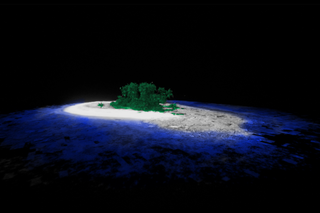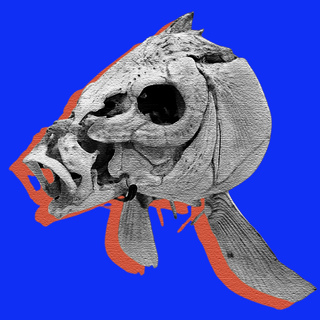
Island Nation to Upload Itself to the Metaverse as Climate Change Threatens Existence
The island nation of Tuvalu is hoping to preserve its cultural heritage in the cloud as climate change threatens its existence — but can the metaverse help?

The South Pacific island nation of Tuvalu has announced it will build a digital version of itself in the metaverse to preserve its cultural heritage as it faces an existential threat due to climate change. “As our land disappears, we have no choice but to become the world’s first digital nation,” Tuvalu’s foreign affairs minister Simon Kofe said while addressing the COP27 climate summit in a video broadcast that showed him standing on a digital replica of an islet that might soon be submerged due to rising sea levels.
“Our land, our ocean, our culture are the most precious assets of our people — and to keep them safe from harm, no matter what happens in the physical world, we’ll move them to the cloud,” Kofe said. As the threat of submersion due to rapidly rising sea levels becomes all too real for many island nations, Tuvalu’s decision speaks volumes about the woefully inadequate climate action that is forcing countries to look for alternate solutions to preserve not only their nation’s heritage, but its very existence.
Tuvalu is a chain of nine islands with a population of 12,000 people located between Australia and Hawaii. Recognized as one of the most “climate-vulnerable states on earth,” scientists say Tuvalu could become uninhabitable in the next 50 to 100 years. However, locals believe that moment may come sooner than expected.
Tuvalu is then hoping to preserve its territory and cultural legacy in the cloud. “Piece by piece we’ll preserve our country, provide solace to our people, and remind our children and our grandchildren what our home once was,” Kofe said.
The metaverse, with its use of new technologies such as augmented reality (AR) and virtual reality (VR), creates an immersive world where users’ avatars can move between several virtual worlds. Some envision the metaverse to become an inextricable part of life in the future. In theory, it may seem like a good option when it comes to preserving knowledge systems and cultural heritage that is being systematically erased in the physical world. Preserving cultural assets in digital form, such as Non Fungible Tokens (NFTs), has already begun. New technologies may also pave the way for immortalizing fast-disappearing indigenous languages and knowledge through indigenous metaverse projects, which could facilitate experiential education.
Related on The Swaddle:
Lakshadweep Islands At Risk of Losing Land Due to Rising Sea Levels: Study
However, virtual reality technology requires large amounts of energy to run. It is estimated that training a single AI model will emit more than 626,000 pounds of carbon dioxide equivalent. An article in The Conversation noted that while the language around new technologies may portray it as consistent with the hopes of a green future, terms such as “cloud computing”, “virtual reality” and “metaverse” are “laden with ‘technological solutionism’ and ‘greenwashing’.” Tuvalu’s proposal to create a metaverse nation as a response to climate change may then feed into the rise in carbon emissions that is exacerbating the crisis today. However, what Kofe seems to be highlighting is the lack of global action on this front that is leaving island nations with little choice when it comes to preserving their lands, culture and nationhood.
As Kofe said, this transition to the metaverse is “also a matter of sovereignty.” The move then is meant to allow Tuvalu to continue functioning as a State, “by providing an online presence that can replace our physical presence,” securing Tuvalu’s statehood and maritime boundaries in the virtual world, if not the physical. The nation can potentially continue to function as one, despite the dispersion of its population and disappearance of its lands.
Tuvalu is not the first country to move to the metaverse. South Korea has been an early investor, and is building a metaverse platform that will allow citizens to virtually access public services and government schemes. Meanwhile, Barbados is reportedly the first country to consider launching a virtual embassy in the metaverse. But what does it mean for an entire nation to exist in the metaverse?
If the future of nations and governance is to involve the metaverse, questions remain around how present geopolitical relations and legal frameworks might translate to the virtual world. “The Metaverse is a blank canvas that nations will use to advance their geopolitical agenda,” Abishur Prakash, co-founder of Center for Innovating the Future, told TRT World.
“When it comes to cyberspace, the player that owns the infrastructure gets to decide what rules to place on the ecosystem,” noted Michael B. Greenwald, Former U.S. Treasury attaché to Qatar and Kuwait. Some reports suggest that the metaverse could place lesser-developed countries on an equal footing, and that the virtual world might foster greater diplomacy and foreign relations. However, a large part of this might depend on who governs the metaverse.
Prakash stated that “there is no single Metaverse the whole world will use.” Instead, different countries will have their own metaverse platforms, potentially splitting the world along “new fault lines.”
Related on The Swaddle:
Why the Origin and Impact of the Metaverse Is Worrying
A report by the Analysis and Research team of the Council of the European Union predicted a future struggle between three regulatory approaches: a regulatory approach by states, a decentralized and open web pushed by tech activists and a profit-driven model backed by the tech sector which would consolidate power in the hands of tech companies while freeing up the virtual world from rules that apply in the physical world.
“In general, the absence of borders and rules in the Metaverse is likely to constitute a further challenge to the existing notion of territorial sovereignty,” the paper noted. The predicted absence of borders could potentially redefine citizenship.
The issues that are increasingly becoming common with the rise of digital technologies today – such as data privacy, misinformation, cyber attacks – may well be heightened if we begin living mostly in virtual realities. There will be a need for greater regulation that goes beyond rules of the physical world. What this may look like remains unclear. Living entirely online may also result in what some call cybersickness – nausea induced by fast-moving graphics in VR technology – that could make it immensely difficult for an entire nation to function online.
For Tuvalu however, the move to the metaverse is in preparation for “the worst case scenario” of climate change. It speaks to the levels at which inadequate global action on reducing fossil fuel emissions – and the deadlock around the loss and damage fund that could help poor countries deal with the impacts of the climate crisis – are threatening the survival of countries. “Only concerted global effort can ensure that Tuvalu does not move permanently online and disappear forever from the physical plane,” said Kofe, adding that without a global commitment to shared well-being, other nations may soon find themselves joining Tuvalu in the metaverse.
Ananya Singh is a Senior Staff Writer at TheSwaddle. She has previously worked as a journalist, researcher and copy editor. Her work explores the intersection of environment, gender and health, with a focus on social and climate justice.
Related


A Startup Could Soon Sell Lab‑Grown Meat in the U.S.
